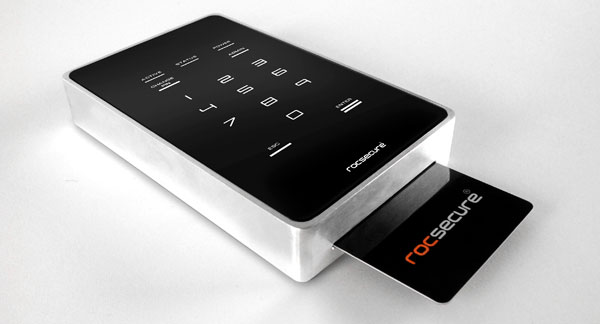Rocstor's Amphibious HDD Kicks Data Security Up a Notch
These guys don't mess around when it comes to protecting your data.
Get Tom's Hardware's best news and in-depth reviews, straight to your inbox.
You are now subscribed
Your newsletter sign-up was successful
Rocstor took the opportunity at CES Las Vegas to introduce us to its new Amphibious hard drive aimed at those hell-bent on keeping their sensitive data locked up like Fort Knox. Featuring a two-step authentication method, the Amphibious uses a smart card, keypad and real time hardware encryption to make sure your files aren't ever accessed by the wrong person. It's also wrapped in aircraft-grade aluminum alloy, so you're not going to break it open either.
"Amphibious is Rocstor's latest replacement device on steroids. Designed to be used in consumer, enterprise, institutional, military and US governmental applications, it is the most secure and innovative data-at-rest device on the market today, and comes in a compact size and attractive design," Asher Ghadoushi, Director for Rocstor, said in a statement today.
"One of the most distinctive features is that the Amphibious can be integrated with standard Smartcards as well as deployed with US Government CAC or PIV smartcards and it uses the only NITS and FIPS 140-2 validated crypto module for real-time hardware encryption with smart card authentication, allowing users to swap out different brands of hard drives or SSD's."
The Amphibious is made up of a SATA HDD (up to 1 TB in capacity) or SSD, has support for both USB 2.0 or Firewire 800 connectivity, and is compatible with Macs, Windows and Linux machines. It features 256-bit AES key strength as well as a FIPS 140-2-certified crypto module, and is capable of speeds of up to 800 Megabytes per second.
The Amphibious will be available Q1 of 2012 through Rocstor's distribution and reseller channels in USA and Canada, but it's not yet clear how much you'll be forking out for the privilege of secure data.
Get Tom's Hardware's best news and in-depth reviews, straight to your inbox.

Jane McEntegart is a writer, editor, and marketing communications professional with 17 years of experience in the technology industry. She has written about a wide range of technology topics, including smartphones, tablets, and game consoles. Her articles have been published in Tom's Guide, Tom's Hardware, MobileSyrup, and Edge Up.
-
back_by_demand It's a shame HDDs weren't amphibious before those floods, maybe the prices wouldn't have gone through the roofReply -
back_by_demand BTW, I don't look at the forum version of the comments very often and just did to edit a typo, does anyone else think Jane's hat looks like an un-smiley :(Reply -
djridonkulus Why's it called Amphibious? Can it work underwater? What was marketing thinking...Reply -
LukeCWM Thank goodness they developed a way to put an SSD in an exclosure accessed with USB 2.0. Other connections are just too fast for me.Reply -
warezme LukeCWMThank goodness they developed a way to put an SSD in an exclosure accessed with USB 2.0. Other connections are just too fast for me.and firewire! when will the insanity end.Reply
-
DSpider LOL at this product.Reply
TrueCrypt anyone? Use a long-ass stream of random characters (like 4 or 5 file hashes, SHA-512), and even with standard AES encryption it would take a really really long time to decrypt. Add AES-Twofish-Serpent and that doesn't triple the time needed, no... More like it adds to the power of 27 or something.
I also agree that "Amphibious" is a stupid name. -
PTNLemay Wait... is it actually water-proof? Or is that just a brand name?Reply
Because if it's the later... that's just a tease.
